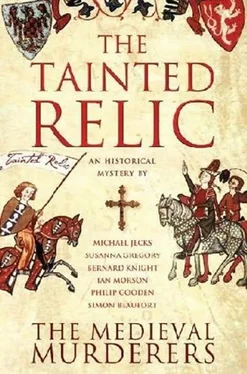As he emerged from the end of Jewry Lane on to Fish Street, Falconer could see that the mob was busy at the top end of the street, where it joined La Boucherie. The houses of some of the more prominent members of Jewry were located there. But then they could withstand the efforts of the mob. They were built of stone, and had sturdy oak front doors. With one eye on the milling crowd, lit by flaming torches and resembling a scene from Hell, Falconer eased along the shop frontages at the lower end of Fish Street. Jehozadok, Hannah and Samson lived in neighbouring houses close by. And Belaset lived below them next to the cloisters of St Frideswide’s Church, just beyond the synagogue. Sometimes the songs of the Talmudic scholars would mingle strangely with the sounds of a religious procession on its way to the shrine of the saint. Tonight, the only sound was the unpleasant and dissonant roar of angry people intent on causing damage. And the racket was getting nearer.
He knocked quietly on Belaset’s door, hoping the woman would realize it was not the mob outside yet. A panel slid back, and Falconer could see a pair of brown eyes behind the grille set in the opening.
‘Belaset. It’s me, William Falconer. You need not let me in. I only wish to know that everyone is safe. Have you seen Jehozadok?’
The woman’s deep, dark eyes stared out through the grille calmly.
‘You need have no fear for him, Master Falconer. He is here with me. And so is my son. I have told Deudone that he is to stay inside and protect us.’
Falconer saw the flash of amusement in her eyes. They both knew it was she protecting her son, not the other way round. He saw the outer edges of her eyes crease up, and imagined the smile on her lips.
‘It helps that Samson and Hannah brought the rabbi here, and have stayed with us too. Thank you for your concern, but you should look after yourself now.’
‘Have you any idea why these people are on the rampage?’
Falconer could hear the heavy sigh despite the thickness of the door.
‘Do they need a reason, when the greatest in the country treat us so badly? But Hannah said she did hear from the cutler who rents his shop from them that there was some talk of a ritual murder near Broken Hays. Whoever found the body has accused us, of course.’
‘A ritual murder…?’ Falconer was appalled. Since the ridiculous story of a child murder in Lincoln some fifteen years previously, horrific tales of Jewish rituals abounded. It needed only some incautious remark to set off a vicious attack on local Jews. Could it have been John Hanny who had unleashed this current riot? And had he done it unwittingly, or with malice in his heart? Either way, the boy needed to be found.
In the dying light of the candles in the nave, Robert Anselm stood at the centre of the labyrinth, far from the turmoil of Jewry. Around him on the floor of the nave were ranged six hemispheres. They resembled rose petals, with the end of the labyrinth walk as the stem of the flower. Each hemisphere was a symbolic representation of the attributes of the world. He turned round slowly on the spot, meditating on each portal individually. The first was Mineral, the next Plant. Then came Animal followed by Human. The last two were Angelic and the Unnameable. The seventh point was the central slab at his feet. Here was Illumination.
He recalled a time more than thirty years earlier, when he had desperately needed illumination, to resolve the great tribulation that had confronted him with the arrival of the relic. The relic was supposed to have been the answer to Oseney Abbey’s prayers-its saviour. The rumours of its arrival had begun three days before, and had caused a great stir among the brethren. Even the young Anselm had welcomed the news at first. The abbey took a great deal of money to maintain, and resources had dwindled of late. A new focus for pilgrimage could make all the difference. Robert Anselm could see that.
Brothers Petroc and Peter had been overcome by the majesty of the relic. They had twittered on after nones, finishing each other’s sentences as they had a habit of doing.
‘Is it not a wonder to behold, young Robert. A piece…’
‘…of the True Cross, here in…’
‘Oxford. At our abbey.’
It was not long, however, before the abbot was cautioning everyone to remain silent on the matter. And Robert Anselm no longer felt elated. No, he had felt only oppressed. By then he had learned a deadly secret, so that, rising from his knees after prayers one evening, he had had to fight for breath. Petroc and Peter had helped him out of the chapel into the fresh air, where he took in great lungfuls of the sweet-scented air. It nevertheless tasted bitter on his tongue. He had retched. He had then hidden his true emotions, by dipping his head between his legs, and moaning. A non-committal sound that the two brothers took as disappointment that the relic was not to be. They had left him to regain his composure. The following morning, though, Anselm had numbly risen from his cot before the third hour of the morning. No great task, because he had not slept all night, and his duties called him to the kitchens. But it had been with a heavy heart that he had begun his daily tasks.
Daily tasks that had absorbed him ever since. This night, thirty years on, he began to tread the route towards the exit of the labyrinth. This journey out represented Union, and action in the world.
Falconer crossed Fish Street, and stood in the doorway of St Aldate’s Church opposite Belaset’s house. The mob was rampaging down the street, led by some massive brute of a man with a thick ginger beard. His face was red, though whether this was due to exertion, drink or the light of the flaming brand in his fist was difficult to tell. One eye was clouded dead white, which gave him the look of one half dead. But his actions were lively enough. He charged up to the door of the Jewish synagogue, and thumped on it with the butt of his firebrand. Sparks flew into the air.
‘Kill the Jews. Kill the child-killers. Kill the monk-killers.’
His cries were echoed like a litany by the jostling crowd of angry people behind him. They were largely men of the town, though there were a few women on the fringes, who by their ragged looks were perhaps there for any pickings from the riot rather than out of conviction. Falconer also spotted the gaudy robes of a few clerks in the midst of the more sober dress of the townspeople. He screwed up his eyes to try to commit their faces to memory, cursing his poor vision. The lenses he had were only of use at close quarters. So the faces of those farthest away were no more than a blur. But then he did see someone he recognized skulking on the edge of the mob. It was unmistakably John Hanny, and he looked distinctly uneasy.
Falconer eased from under the shadow of the church porch, and skirted round the crowd, closer to where Hanny stood. Ginger-beard was having no success with his assault on the synagogue door, and those at the back of the mob were beginning to drift off down Pennyfarthing Street, and Jewry Lane. All but the most hotheaded would soon begin to realize that their shouts, and the noise of their attack on the Jews’ houses, would bring the constable and his crew to the scene. And Falconer knew he should get John Hanny away before that happened. Peter Bullock was no respecter of university privileges. In fact they irked him, despite his friendship with Regent Master Falconer. He would cheerfully incarcerate an errant clerk in the Bocardo, if he could catch him at wrongdoing.
As the pent-up emotions of the individuals in the mob began to leach away, and they began to disperse, Falconer reached his guilty student clerk. He grabbed his arm tightly.
‘John Hanny, you will come with me. Now.’
The boy’s face, as it turned to Falconer, was a picture of shock, and shame. He stammered a sort of lame excuse, but his teacher was not in a mood to listen. He strode off down Little Jewry Lane, dragging the youth stumbling and groaning behind him. Turning swiftly left and then right, he hurried down the unsavoury alley accurately named Schitebarne Lane, and back towards Aristotle’s Hall.
Читать дальше












